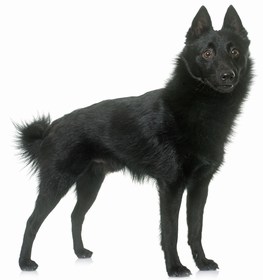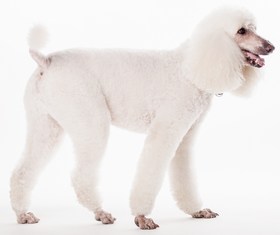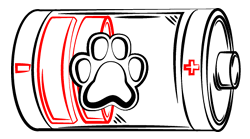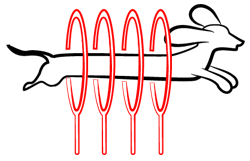
Paws ‘N’ Pups Quickview
Size
| Energy Level
| Trainability
| Paws ‘N’ Pups Rank
|
Characteristics
| Physical Characteristics: Height: 8-15” Weight: 25-40 lbs. Energy Level: Low – Moderate | Colors: The Schipper-Poo is found in the following colors:
|
Health & Longevity
Average Life Span: 12-15 years
Medium-sized and rambunctious, the Schipper-Poo is a crossbreed between a Schipperke and a Poodle. These pups, also known as Schipper-Doodles, and Schipperkedoodles, are prone to a long list of major health issues, as a result of both parent breeds. Unfortunately, these major health concerns are genetic, which means there is no way to tell if your chosen Schipper-Poo pup will be affected or not, later in life. Most of the inherited health issues become prominent as your Schipper-Poo ages.
Autoimmune Thyroiditis
This is the most common ailment to Schipper-Poos. Also known as hypothyroidism, this condition occurs when the immune system fails to combat viral and bacterial attacks. You may notice your dog seems sick all of the time. He may look like he feels horrible, weak, and disoriented. This condition is for a lifetime, but manageable with vet-prescribed hormone supplements.
Other major and minor health conditions that could affect your Schipper-Poo include bloat, cataracts, hip dysplasia, skin allergies, hypothyroidism, Cushing’s disease, and patellar luxation. The average lifespan for a Schipper-Poo, despite possible health problems, ranges between 12 to 15 years. To better manage and prepare for any health issues that might arise, make routine vet visits a priority.
Temperament & Train-ability
A rare crossbreed, the Schipper-Poo is a sweet, loyal pup with a love of both children and other dogs. He gets along well with everyone, so he probably wouldn’t be the best watchdog at night-time. He would prefer to sleep and cuddle with his owners in the evenings. If someone is obviously threatening to the Schipper-Poo, these pups can be very protective. Their bark is loud and fierce, but they rarely lunge to bite or attack anything or anyone. He would make a great family pup, especially if he grows up with your children.
If you raise kids with your Schipper-Poo, make sure your youngsters know how to interact respectfully with a dog. All dogs have their tolerance limits, and they may lash out if their tail is pulled, their ears are grabbed, or someone hurts them. Good behavior towards your Schipper-Poo will elicit good behavior in return. As for other dogs, your Schipper-Poo is cool with other pups as long as they are playful and sweet like him. If a dog challenges him, he will most often walk away to avoid conflict. This makes him a great addition to a dog park, as he can truly play and frolic with other good-natured dogs.
The Schipper-Poo loves to run, jump, and expend his energy, but he can also snuggle on the couch with his owner after a long afternoon. His versatile exercise needs make him an ideal pet for apartments, as does his quiet nature.
He needs a single long walk, or two short walks, per day. Adding in a stop at the dog park for him to socialize with other pups would be a fantastic idea as well. He would also be happy with a fenced-in backyard where he can use about 30 minutes to frolic and explore. These crossbreeds need mental stimulation as well as physical exercise. Invest in a few challenge-oriented toys that he can solve and master. This will keep him occupied for hours, allowing you enough time to get some housework done.
Most of the time, the Schipper-Poo is an easy, eager-to-please pup to train. However, he does have a touch of stubbornness, resulting from his Schipperke genetics, but it is manageable. This stubborn streak abates on its own when he realizes that you are the dominant one; the leader of his pack. Play games to hold his attention during training and keep the sessions interesting for him. He will pick up on your commands with a few simple repeats, making him a better, more well-rounded pup in the future.
Grooming
Poodles are known for their soft curls and close-cropped coat, whereas a Schipperke boasts shaggy strands in some places and slick-backed fur in others. The Schipper-Poo can lean towards either of these coat types. Or, he could develop a unique combination of both coats. If he leans more towards a Poodle’s coat, he needs daily brushing to keep his hair soft and kink-free. If his fur is more like the Schipperke, he needs to be brushed 3-4 times a week with a firm-bristle brush to eliminate tangles.
Schipper-Poos need their toenails trimmed on a regular basis, around every 6-8 weeks. Some of these pups have black toenails, making it more difficult to see and avoid the quicks. If you lack confidence in trimming his toenails, take him to see a professional groomer. They can also bathe him, brush him, clean his ears, trim his coat, and brush his teeth, while he’s there.
Diet
To encourage healthy eating habits, feed your Schipper-Poo two scheduled meals per day. Both breakfast and dinner should consist of 1 ½ cups of dry, high-quality kibble. It is also important that your Schipper-Poo is given plenty of water throughout the day, especially in the summer months. These dogs need to be well-hydrated to maintain their energy and overall health.
Looking for a Schipper-Poo?
 Find A Schipper-Poo Breeder |  Schipper-Poo Puppies For Sale |  Adopt A Schipper-Poo |
Cost
Because of their uncommon appearance in the dog world, you may have a tough time tracking down a Schipper-Poo breeder. If you get lucky, expect to pay between $450 to $600 for a Schipper-Poo pup. Or, take your search to a local animal shelter. You might have more luck with finding an older Schipper-Poo there. Adoption fees range from $150 to $200, but that depends on the county you are in, and both the age and health history of your new pup.
Paws ‘N’ Pups Ranking
Paws ‘N’ Pups ranks every breed out of 4 with 1 being easiest to integrate into your life and 4 being the toughest – The lower the ranking the better.
Ranking takes into account a few basic factors including cost, skill level needed, high vs low maintenance and how critical regular training is to success. The Schipper-Poo easily ranks a 1. The primary downside is their rarity, as these dogs can be difficult to locate. However, if you are lucky enough to incorporate one of these pups into your life, his companionship and love are infinite. He would make an excellent pet for anyone seeking a reliable, sweet dog for cuddles, playtimes, and overall friendship. This breed is a fantastic choice for a novice or first-time dog owner.
Breeds Similar To Schipper-Poo
 Schipperke |  Poodle |  Brussels Griffon |  Affenpinscher |




